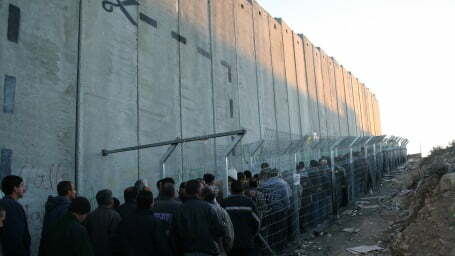In the last two weeks, it seemed that Israel and Jordan were able to overcome their differences over the Mughrabi issue, and to cooperate despite the mutual resentment they had accumulated towards each other in the context of what was happening in Jerusalem. On November 24, Sheikh Yussef al-Qaradawi, one of the most important jurists in the Sunni world who also serves as chairman of the Board of Trustees of the International Jerusalem Affairs Authority, addressed an excited letter to King Abdullah of Jordan, asking him to save Jerusalem and beyond. The Mughrabi are being demolished by Israel.Kardawi's unusual letter hit waves in Jordan, and a source in the palace reported to the media that the king instructed the government to monitor the issue closely, and that he also intends to raise the Mughrabi affair in his upcoming visits to Germany and the US. The source stressed that under the Israeli-Jordanian peace agreement, the "religious sponsorship of the holy places of Islam and Christianity in Jerusalem" belongs to the culprits.
Kardawi's letter was unusual because he allegedly adopted Jordan's claim to lead the Arab political-diplomatic struggle over al-Aqsa and the holy sites in Jerusalem. Yet worded in a way that would be most appealing to Jordanian ears, it was part of Kardawi's overall Arab and Islamic move to "rescue al-Aqsa" that called for an armed struggle against Israel, the withdrawal of Arab initiatives for peace, the suspension of all peace agreements with Israel and the expulsion of ambassadors from Arab countries. In any case, the letter achieved its purpose, and Jordan used it to recruit the heads of the encirclement in Jerusalem and al-Aqsa to speak in praise. Following pressure from Jordan and Egypt, Prime Minister Netanyahu decided to delay the demolition of the Mughrabi Valley . The day after President Peres' visit to Jordan, Which was planned to be secret but leaked by the Jordanians and won headlines, "The king summoned Peres and sent him an urgent message to Netanyahu," a senior Jordanian ministry official said, stating that "Jordan has managed to stop Israel's work up the Mughrabi."
This chain of events ended, for the first time in many years, with a good word for Israel from the official Jordan. The headline of the Jordanian news agency was: "The Ministry of Endowments expresses satisfaction with the Israeli response to Jordan's request not to harm the Mughrabi." However, the hopes of those seeking to see real cooperation between Israel and Jordan on this important and sensitive issue were soon dashed. In the Jordanian and Arab public discourse, there was criticism of being content with "postponing" the demolition of the Mughrabi Valley, and the demand was heard to completely cancel Israel's plans to renovate the bridge. Yesterday, an "appropriate Zionist response" in the form of an infiltration of Givot youth activists arrived in a closed military area near the border with Jordan in Qasr al-Yehud, in protest of Jordan's involvement in the Mughrabi ridge. At the same time, a protest is being heard from the right about the closure of the only entrance from which Jews are allowed to enter the Temple Mount.
A technical and safety issue is becoming a powerful religious and national explosive, and the risk of a large-scale escalation lies at the doorstep of everything. But Israel and Jordan are trapped, as always, in the Palestinian vicious circle: while Israel seeks to undermine the status of the Palestinian Authority in Jerusalem, Jordan fears a political clash with the PA in general and in Jerusalem in particular. For this reason, Jordan has completely denied the reports of its cooperation with Israel (contrary to its dictates to Israel) regarding the Mughrabi cause. In order to allay the Palestinian Authority's growing anger over its excessive activity in the al-Aqsa compound, the Jordanian ambassador to Ramallah also emphasized that with regard to Jerusalem and al-Aqsa, Jordan does not negotiate with Israel, and coordinates its steps with the PA alone.
The need for Israel's political wisdom in this affair, and the expectation that it will restrain and forgive its logical demands, do not absolve the Jordanians of soul-searching either. The Jordanian government and its spokesmen do not spare conspiracy theories in the local media, including the establishment, centered on the claim that Israel seeks to prepare a passage for tanks to occupy al-Aqsa as part of the plan to build the Third Temple. However, it seems that the professionals in Jordan are at least able to reach a quiet understanding with Israel, and the wording of the official response as praise of the Jordanian Ministry of Endowments, and not of the Ministry of Foreign Affairs or the palace, is significant in this context. The disturbing concern is that elements in the decision-making centers in the kingdom thwart understanding with Israel in the Ma'aleh Mughrabi affair, whether in an act that prevents an ideological-religious position; And whether by default, stemming from the Jordanian leadership's fear of risking a political initiative against Israel in the face of defiant and dominant public opinion in the wake of the Arab Spring.
It is possible that in these circumstances the Israeli-Jordanian cooperation in the al-Aqsa compound will be discussed in secrecy and volatility in the good scenario as well. Jordan must understand, however, that Lapom Tsara Agra. If it wants to win points in the struggle for the leadership of Arab-Islamic interests in the matter of Jerusalem, it must risk political initiative and not frustrate one or be indifferent to it. Such behavior would play into the hands of extremists on both sides, and could end in emptying Jordan's claim to religious protection of the holy sites in Jerusalem, and transferring it to other Arab and Islamic elements that the Israeli and Jordanian governments do not want to visit.

















